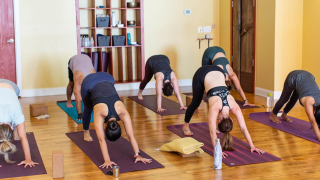
D.C. resident Charlie Everett’s has had such bad back pain since starting working from home during the coronavirus pandemic that lying on the floor became the best option.
“My lower back just became so, so tight and so, so sore.” Everett said. “I needed to make my back as flat as possible. I couldn’t even sit in a chair anymore.”
Everett creates digital campaigns for a nonprofit and spends at least nine hours a day on a computer. Working from home seems to have contributed to the pain.
As a greater portion of the nation’s workforce logs on from home, calls to chiropractors have increased, an expert at Johns Hopkins Hospital said. Back pain can indicate lasting damage if it’s not addressed.
The hospital’s director of spine rehabilitation, Dr. Akhil Chhatre, said that increased back pain during the coronavirus stay-at-home orders can be blamed on unhealthy patterns as many work from less-disciplined environments.
“People are working from their beds or from their couches, which can translate to more pressure and more stress on the neck and lower back,” Chhatre said. “If somebody were to do that for a couple days or for a week, they would probably cope, but now as we’re going into more projected months for some areas with this type of work, it’s causing a lot of issues.”
Bad posture during the quarantine isn’t the only thing to blame for back and neck pain. Chhatre said that unhealthy eating habits, immobility for long periods of time and stress all contribute to pain.
Local
Washington, D.C., Maryland and Virginia local news, events and information
He suggested taking multiple short walks a day, avoiding staying in one position for longer than 30 minutes, considering a standing desk, stretching and maintaining a healthy diet.
Smokers, excessive drinkers, people who are obese and those who do not regularly exercise are more likely to experience pain.
“Considering everything that’s going on, this is a tremendous toll that it’s taking on even the healthiest individual,” Chhatre said.
Mercedes Yanez said she feels a toll on her body as she works remotely for Northern Arizona University. She said her living conditions make the pain even worse.
“It’s been difficult to have such a small apartment during the quarantine because I really don’t have a lot of space to move around,” she said.
Yanez, who had back problems before the pandemic, said it’s now more difficult to visit or get in touch with a chiropractor. She has taken it upon herself to find remedies.
“I’ve been taking more walks and doing yoga and stretching every day. It’s not something that we usually think about to do. But while we’re all cooped up inside, it’s something that’s really helped me,” she said.
Gopi Kinnicutt, the owner of Bhakti Yoga DC, said more movement may relieve your back pain too.
“Repeated stretches and the holding of healthy posture strengthens different parts of the body,” she said. “A lot of people collapse their chests while sitting and working at a desk from home because their back, neck and spinal muscles aren’t strong enough to hold them upright for longer periods of time. This is why movement is really important to create joint mobility, muscle strength and circulation.”
Bad posture can negatively affect one’s mental health and back pain can be indicative of stress and anxiety held within the body, Kinnicutt said. She suggested stretching, doing yoga and practicing deep breathing.
“Your breath has this power to stabilize the mind and your racing anxiety,” she said. “The breath can help one find presence and sensations in the body.”
But if yoga and Chhatre’s recommendations don’t seem to be working for you, the doctor advised taking further action.
“If folks are feeling like they’re having this pain and if it’s lasted for longer than a few weeks, reach out to your doctor,” he said. “Most offices are offering tele-visits and you can do it from the comfort of your home.”
So whether you lay out on the floor to ease your back pain or practice yoga, Chhatre said it’s important to manage your aches to prevent lasting injuries and strains once stay-at-home regulations are completely lifted.



